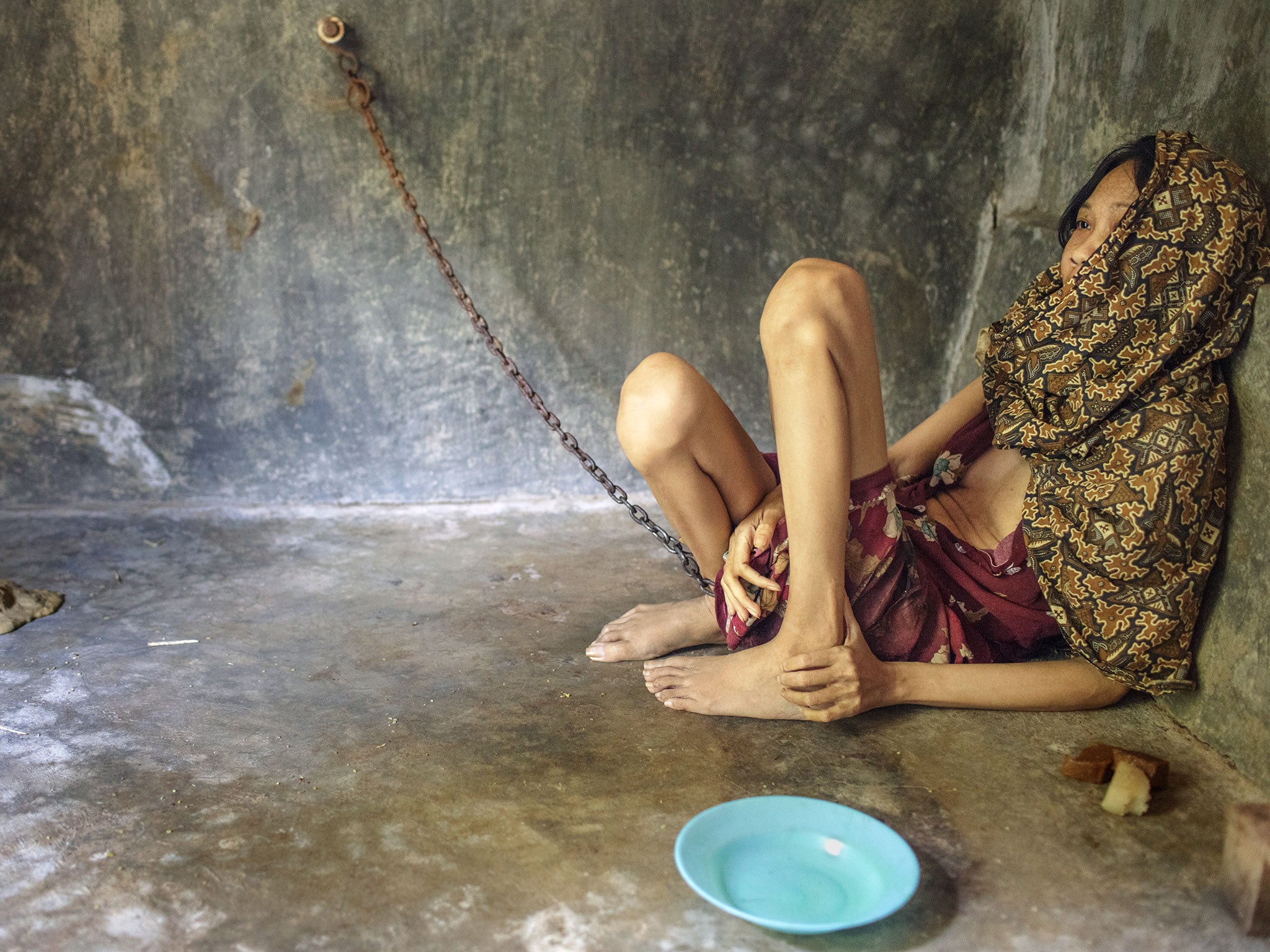Indonesia's mentally ill 'shackled and sexually abused' in care centres
Indonesia has only 48 mental hospitals, but a population of 250 million

Your support helps us to tell the story
From reproductive rights to climate change to Big Tech, The Independent is on the ground when the story is developing. Whether it's investigating the financials of Elon Musk's pro-Trump PAC or producing our latest documentary, 'The A Word', which shines a light on the American women fighting for reproductive rights, we know how important it is to parse out the facts from the messaging.
At such a critical moment in US history, we need reporters on the ground. Your donation allows us to keep sending journalists to speak to both sides of the story.
The Independent is trusted by Americans across the entire political spectrum. And unlike many other quality news outlets, we choose not to lock Americans out of our reporting and analysis with paywalls. We believe quality journalism should be available to everyone, paid for by those who can afford it.
Your support makes all the difference.Mentally ill Indonesians are routinely shackled by their families or social care facilities, and face psychological and sexual abuse at the hands of their carers, a new report by Human Rights Watch says.
An estimated 57,000 have experienced such conditions, known as “pasung”, in the South-east Asian nation, despite a ban on the practice since 1977.
The report, released today, documented the cases of 175 people who have been recently rescued from pasung, and another 200 in recent years. It also documents the shocking treatment patients in facilities receive in a country where mental illness is often considered to be the result of a curse, or possession by evil spirits.
“You can throw a stone anywhere in Java and you will hit someone in pasung. That’s how prevalent it is,” the report quotes Yeni Rosa Damayanti, the head of Perhimpunan Jiwa Sehat-Indonesian Mental Health Association, Jakarta, as saying. In the longest case documented by the group, one woman spent nearly 15 years locked in a room.
Ismaya, 24, was shackled for three weeks in a healing centre. “They chained my hands with a dog leash and put chain to my leg. I used to try to get out. The more I tried to get out, the tighter it became,” he said. “They never opened it. There was no toilet. I would scream to go to toilet but they wouldn’t allow it.”
The majority of cases of pasung occur in remote rural areas, where families have little or no education about mental health, and just as little access to mental health services. Across the country, almost 90 per cent of those who may want mental health services have no way to reach them, and there are only 48 mental hospitals in a country of 250 million.
“Indonesia has a strong healthcare system,” Shantha Rau Barriga, Human Rights Watch’s director of disability rights told The Independent. “But unfortunately mental healthcare is not included in this.”
Carika, 29, spent four years locked in a goat shed at the back of her family’s property in central Java, where she would eat, sleep and defecate, begging her family to let her out.
She was eventually freed by the country’s anti-pasung police, after a campaign by an Indonesian journalist. But after escaping her shackles, she was transferred to a mental health treatment where she said she was forced to take medication, given electroshock therapy against her will, and raped by a fellow inmate.
“They put electricity on my temples and forehead; it hurt very much,” she said. “I was awake when they gave it. I could see it all. They tied my hands to the bed.”
Such treatment is routine in traditional healing centres, according to HRW, which also documented unsanitary and crowded conditions at private institutions.
The Indonesian government has launched several initiatives to combat the practice of pasung and improve the treatment of mentally ill people. But, says HRW, there is a persistent lack of awareness and adequate facilities. The Indonesian government estimates more than 18,000 mentally ill people are currently in pasung.
Eventually, Carika made it back to her family. But in the past week, HRW has discovered that they have once again forced her into confinement in the goat shed, according to Ms Rau Barriga.
“The family isn’t getting the education they need. The myths surrounding mental illness are still prevalent,” she said. “It is essential that alternatives are available to traditional healers.”
The group has called on the Indonesian government to renew its efforts to tackle the practice, strengthen laws surrounding mental illness and to sensitise government workers to the problem.
It also calls on international donors, including DfID, to work with Indonesia on ways to tackle the problem.
Join our commenting forum
Join thought-provoking conversations, follow other Independent readers and see their replies
Comments